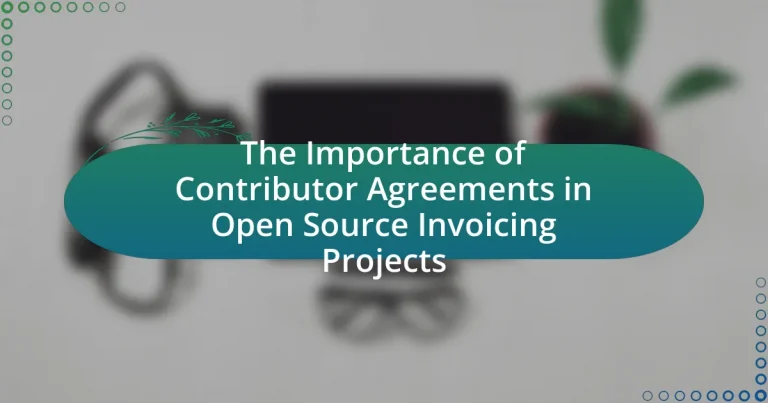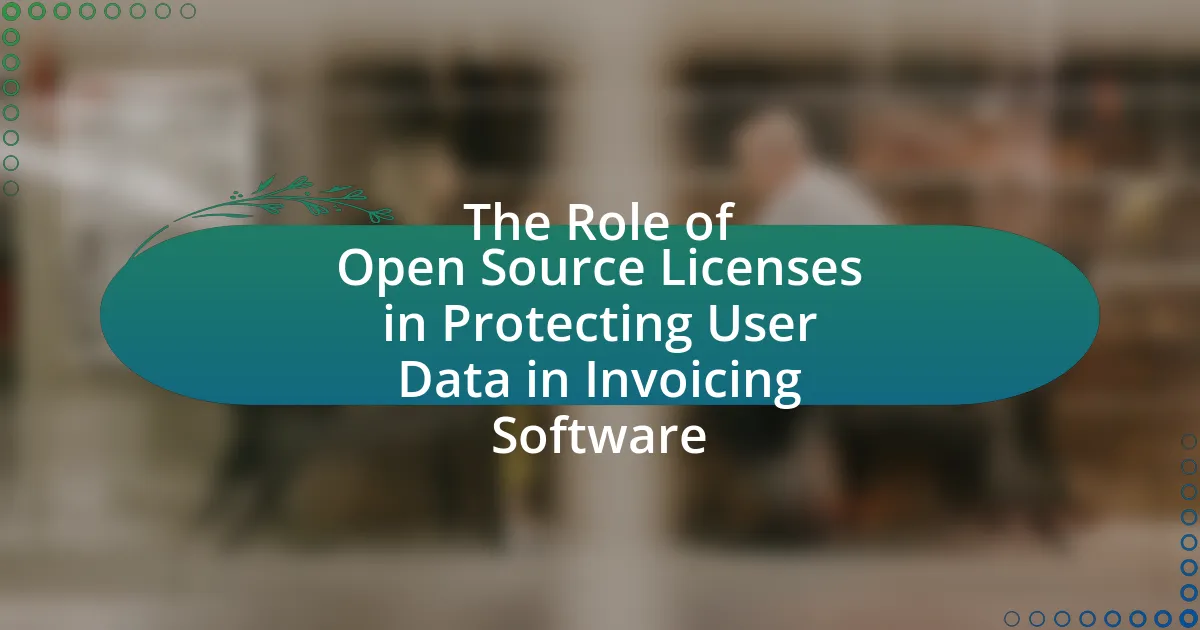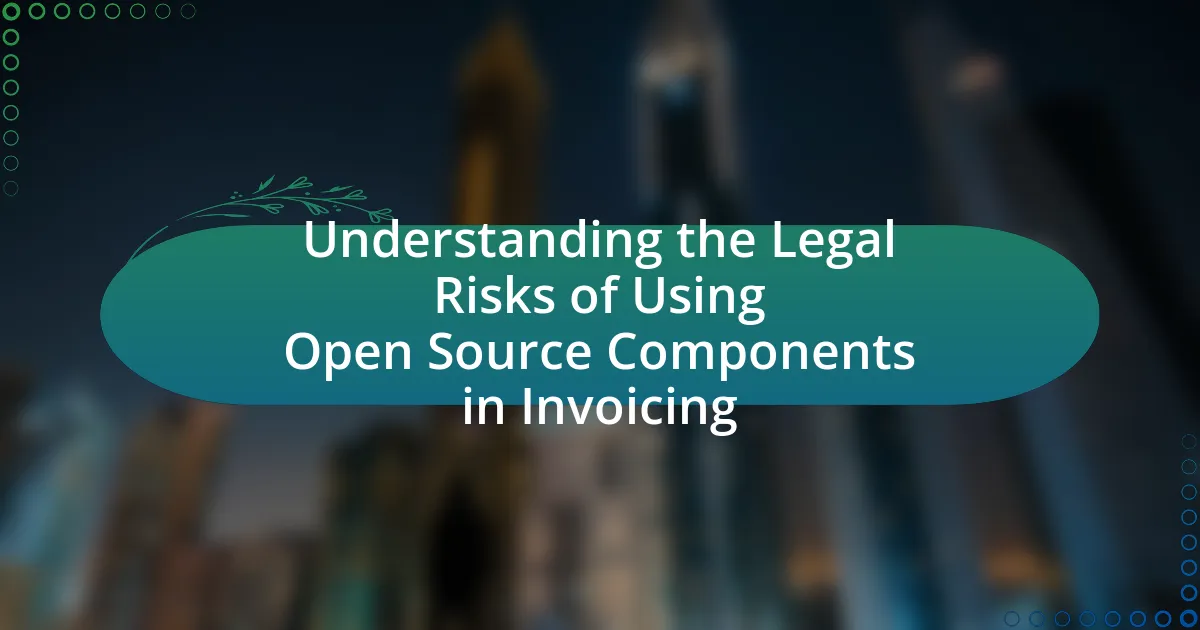Contributor Agreements are essential legal documents in Open Source Invoicing Projects that define the terms under which contributors provide their code or other contributions. These agreements clarify ownership, rights, and responsibilities, protecting both contributors and project maintainers while ensuring compliance with licensing requirements. The article discusses the importance of these agreements in preventing disputes over intellectual property, enhancing collaboration, and maintaining project sustainability. It also addresses common misconceptions, challenges, and best practices for implementing and managing Contributor Agreements effectively, highlighting their role in fostering community trust and ensuring a productive open-source environment.

What are Contributor Agreements in Open Source Invoicing Projects?
Contributor Agreements in Open Source Invoicing Projects are legal documents that outline the terms under which contributors provide their code or other contributions to a project. These agreements typically specify the rights and responsibilities of both the contributors and the project maintainers, ensuring that contributions can be used, modified, and distributed according to the project’s licensing terms. They help protect the intellectual property of the project and clarify the ownership of contributions, which is crucial for maintaining the integrity and sustainability of open source projects.
Why are Contributor Agreements essential for Open Source Invoicing Projects?
Contributor Agreements are essential for Open Source Invoicing Projects because they establish clear legal terms regarding the ownership and licensing of contributions. These agreements protect both the contributors and the project maintainers by ensuring that all contributions are made with the understanding of how the code will be used, distributed, and attributed. For instance, they help prevent disputes over intellectual property rights, which can arise if contributors do not explicitly agree to the terms under which their work will be utilized. By having a formal agreement, projects can maintain a consistent licensing framework, which is crucial for collaboration and sustainability in open source environments.
What legal protections do Contributor Agreements provide?
Contributor Agreements provide legal protections by clearly defining the rights and responsibilities of contributors and the project maintainers. These agreements typically ensure that the intellectual property rights of the contributions are assigned to the project, protecting the project from potential legal disputes over ownership. Additionally, Contributor Agreements often include clauses that grant the project maintainers the right to use, modify, and distribute the contributions without further permission, which safeguards the project’s continuity and integrity. By establishing these terms, Contributor Agreements help mitigate risks associated with copyright infringement and ensure compliance with licensing requirements, thereby fostering a secure environment for collaboration in open source projects.
How do Contributor Agreements clarify ownership and rights?
Contributor Agreements clarify ownership and rights by explicitly defining the terms under which contributions are made to a project. These agreements typically outline that contributors retain ownership of their original work while granting the project maintainers certain rights to use, modify, and distribute the contributions. This dual ownership structure ensures that contributors are recognized for their work, while also providing the project with the legal framework necessary to incorporate those contributions into the larger project without infringing on the contributor’s rights. By specifying these terms, Contributor Agreements help prevent disputes over intellectual property and ensure that all parties understand their rights and obligations, thus fostering a collaborative environment in open source projects.
What types of Contributor Agreements are commonly used?
Commonly used Contributor Agreements include Individual Contributor License Agreements (ICLAs), Corporate Contributor License Agreements (CCLAs), and Contributor Agreements for specific projects. ICLAs are typically signed by individual contributors to grant rights to the project maintainers while retaining their copyright. CCLAs are used when a corporation contributes to a project, ensuring that the company retains rights over its contributions. Additionally, some projects may utilize specific Contributor Agreements tailored to their needs, which outline the terms of contribution and rights granted. These agreements are essential for clarifying ownership and usage rights, thus protecting both contributors and project maintainers.
What is the difference between Contributor License Agreements and Developer License Agreements?
Contributor License Agreements (CLAs) and Developer License Agreements (DLAs) differ primarily in their focus and purpose. CLAs are legal documents that allow contributors to grant rights to their contributions to a project, ensuring that the project maintainers can use, modify, and distribute those contributions under specified terms. In contrast, DLAs are agreements that define the rights and responsibilities of developers who are actively involved in the development process, often including terms related to employment or contractual obligations.
The distinction lies in the scope: CLAs typically apply to external contributors who submit code or documentation, while DLAs are more relevant to developers who are part of the core team or organization managing the project. This differentiation is crucial for managing intellectual property and ensuring compliance with licensing requirements in open source projects.
How do different agreements impact project collaboration?
Different agreements significantly impact project collaboration by establishing clear roles, responsibilities, and expectations among contributors. For instance, contributor agreements can define intellectual property rights, ensuring that all parties understand ownership and usage of project outputs. This clarity fosters trust and reduces conflicts, which are critical for effective collaboration. Research indicates that projects with well-defined agreements experience higher levels of participation and lower instances of disputes, as contributors feel secure in their contributions and the project’s direction.

How do Contributor Agreements affect project sustainability?
Contributor Agreements enhance project sustainability by establishing clear legal frameworks that protect both contributors and the project itself. These agreements define the rights and responsibilities of contributors, ensuring that intellectual property is properly managed and reducing the risk of legal disputes. For instance, projects with Contributor License Agreements (CLAs) can maintain consistent licensing, which is crucial for long-term viability and community trust. Additionally, having a formal agreement can encourage more contributors to participate, knowing their contributions are legally recognized and protected, thereby fostering a more robust and sustainable project ecosystem.
What role do Contributor Agreements play in maintaining project integrity?
Contributor Agreements play a crucial role in maintaining project integrity by establishing clear legal frameworks that govern contributions. These agreements ensure that contributors grant the project maintainers the necessary rights to use, modify, and distribute their contributions, which protects the project from potential legal disputes over intellectual property. By defining the terms of contribution, such as licensing and attribution, Contributor Agreements help maintain a consistent quality and direction for the project, fostering trust among contributors and users. This structured approach minimizes risks associated with copyright infringement and ensures that all contributions align with the project’s goals and standards.
How do Contributor Agreements help in conflict resolution?
Contributor Agreements help in conflict resolution by clearly defining the rights and responsibilities of contributors and the project maintainers. These agreements establish a legal framework that outlines ownership of contributions, licensing terms, and dispute resolution processes, which can prevent misunderstandings and disputes. For instance, by specifying how contributions can be used and attributed, Contributor Agreements reduce the likelihood of conflicts over intellectual property rights. Additionally, they often include clauses for mediation or arbitration, providing structured methods for resolving disagreements without resorting to litigation. This clarity and structure foster a collaborative environment, essential for the success of open source projects.
What are the long-term benefits of having Contributor Agreements in place?
Having Contributor Agreements in place provides long-term benefits such as legal clarity, protection of intellectual property, and enhanced collaboration. Legal clarity ensures that all parties understand their rights and obligations, reducing the risk of disputes. Protection of intellectual property safeguards the contributions made by individuals, ensuring that the project maintains ownership and control over its assets. Enhanced collaboration fosters a more organized and efficient development process, as contributors are aware of the terms under which they are working, leading to increased participation and innovation. These benefits are supported by the fact that many successful open-source projects, like the Linux kernel, utilize Contributor Agreements to maintain order and protect their contributions effectively.
How can Contributor Agreements enhance community trust?
Contributor Agreements enhance community trust by establishing clear expectations and responsibilities for contributors. These agreements outline the rights and obligations of both the contributors and the project maintainers, which fosters transparency and accountability. When contributors understand how their contributions will be used and the legal implications involved, they are more likely to engage with the project confidently. Research indicates that projects with well-defined Contributor Agreements experience higher levels of participation and collaboration, as contributors feel secure in their contributions and trust that their work will be respected and properly attributed.
What transparency do Contributor Agreements provide to contributors?
Contributor Agreements provide transparency to contributors by clearly outlining the rights and responsibilities associated with their contributions. These agreements specify how contributions will be used, the ownership of intellectual property, and the licensing terms, ensuring that contributors understand how their work will be integrated into the project. For instance, many agreements include clauses that detail whether contributors retain any rights to their contributions or if they are transferring those rights to the project maintainers. This clarity helps prevent misunderstandings and disputes regarding the use of contributions, fostering a more collaborative and trusting environment in open source projects.
How do Contributor Agreements foster a collaborative environment?
Contributor Agreements foster a collaborative environment by establishing clear expectations and responsibilities among contributors. These agreements outline the terms under which contributions are made, ensuring that all parties understand their rights and obligations, which reduces ambiguity and potential conflicts. By providing a structured framework, Contributor Agreements encourage participation from diverse contributors, as they feel secure in their contributions knowing that their rights are protected. Furthermore, these agreements often include provisions for licensing and intellectual property, which facilitate smoother collaboration and integration of various contributions into the project. This clarity and protection ultimately enhance trust and cooperation among contributors, leading to a more productive and inclusive collaborative environment.

What challenges are associated with Contributor Agreements in Open Source Invoicing Projects?
Challenges associated with Contributor Agreements in Open Source Invoicing Projects include legal complexities, contributor reluctance, and enforcement issues. Legal complexities arise from varying jurisdictional laws that can complicate the agreement’s validity and enforceability. Contributor reluctance often stems from concerns over intellectual property rights and the fear of losing control over their contributions. Enforcement issues can occur when projects lack resources to monitor compliance with the agreements, leading to potential disputes over contributions. These challenges can hinder collaboration and the overall success of open source invoicing initiatives.
What common misconceptions exist about Contributor Agreements?
Common misconceptions about Contributor Agreements include the belief that they are only necessary for large projects, that they limit contributors’ rights, and that they are overly complex. Contributor Agreements are essential for all projects, regardless of size, as they clarify ownership and usage rights, protecting both the project and contributors. Additionally, these agreements do not inherently restrict contributors’ rights; rather, they establish clear terms that can enhance collaboration. Lastly, while some may perceive them as complicated, many agreements are straightforward and designed to be easily understood, ensuring that all parties are aware of their rights and responsibilities.
How can misunderstandings about Contributor Agreements be addressed?
Misunderstandings about Contributor Agreements can be addressed through clear communication and education. Organizations should provide detailed explanations of the terms and implications of Contributor Agreements, ensuring that contributors fully understand their rights and responsibilities. Workshops, FAQs, and accessible documentation can facilitate this understanding. Research indicates that effective communication reduces confusion and enhances collaboration in open source projects, as seen in studies highlighting the correlation between clarity in agreements and contributor satisfaction.
What are the potential drawbacks of Contributor Agreements?
Contributor Agreements can impose limitations on contributors, such as restricting their ability to use their own contributions in other projects. These agreements often require contributors to assign copyright or grant exclusive licenses, which can lead to loss of control over their work. Additionally, Contributor Agreements may create legal complexities that deter potential contributors due to concerns about liability or the implications of signing such documents. For instance, a survey by the Open Source Initiative found that legal concerns are a significant barrier for contributors in open source projects, highlighting the potential drawbacks of these agreements.
How can projects effectively implement Contributor Agreements?
Projects can effectively implement Contributor Agreements by establishing clear guidelines and processes for contributions. This includes drafting a well-defined Contributor Agreement that outlines the rights and responsibilities of contributors, ensuring that it is easily accessible and understandable. Additionally, projects should integrate the Contributor Agreement into the contribution workflow, requiring contributors to sign or acknowledge the agreement before submitting their work. This practice not only protects the project’s intellectual property but also fosters a transparent and collaborative environment. Evidence of successful implementation can be seen in established open-source projects like Apache and Mozilla, which have structured Contributor Agreements that facilitate contributions while safeguarding legal interests.
What best practices should be followed when drafting Contributor Agreements?
When drafting Contributor Agreements, it is essential to ensure clarity, specificity, and legal compliance. Clear definitions of terms, roles, and responsibilities help prevent misunderstandings. Specificity regarding the scope of contributions, ownership of intellectual property, and licensing terms is crucial to protect both contributors and the project. Legal compliance with applicable laws, such as copyright and patent laws, ensures that the agreement is enforceable and protects the interests of all parties involved. Additionally, including a dispute resolution mechanism can facilitate conflict resolution without resorting to litigation. These practices are supported by the fact that well-drafted agreements reduce the risk of legal disputes and enhance collaboration in open source projects.
How can projects ensure contributors understand the agreements?
Projects can ensure contributors understand the agreements by providing clear, concise documentation and conducting onboarding sessions. Clear documentation includes simplified language and examples that illustrate key points of the agreements, making it easier for contributors to grasp the terms. Onboarding sessions can involve interactive discussions where contributors can ask questions and receive immediate clarification, fostering a better understanding of the agreements. Research indicates that effective communication strategies significantly enhance comprehension, as seen in studies on organizational behavior, which show that clarity in documentation leads to higher retention of information among participants.
What are the key takeaways for managing Contributor Agreements?
Key takeaways for managing Contributor Agreements include ensuring clarity in terms, maintaining proper documentation, and fostering open communication. Clarity in terms helps prevent misunderstandings regarding rights and responsibilities, which is crucial for both contributors and project maintainers. Proper documentation, including signed agreements, provides legal protection and establishes a clear record of contributions. Open communication encourages collaboration and addresses any concerns or questions contributors may have, enhancing trust and engagement within the project. These practices are essential for the successful management of Contributor Agreements in open source invoicing projects.




